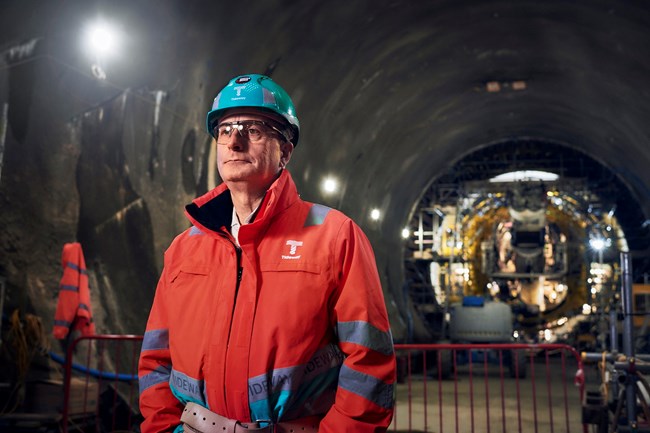Super Sewer now 40 per cent complete as Tideway reports on year of progress
The company building London’s new super sewer has completed 40 per cent of construction and is on track to deliver the project on time in 2024*.
As the 2018/19 financial year closes and with the first stages of the project now complete, Tideway has updated its cost estimate based on the work left to do.
The team has achieved complex engineering feats - building seven new pieces of land in the Thames, including at Chelsea, Blackfriars and Putney, and digging five giant shafts up to 50m deep below London.
A workforce of more than 2,000, including miners from across the world, are now tunnelling underground to create the 25km-long tunnel. The first kilometre from Battersea to Chelsea was completed at the end of March and two other huge tunnelling machines have also started their journeys.
Five years since the project was given the green light Tideway is now updating its estimate of overall costs based on work left to do. With the first and most unpredictable phase of the project now complete, the Company’s revised estimate is £3.8bn compared to £3.52bn (£3.14bn in 2014 prices) which represents an eight per cent increase.
There will be no change to the estimated £20-25 annual cost for Thames Water bill-payers, as costs remain well within the original projection for customer charges. The company has already raised enough money to complete the project and requires no further funding as a result of this cost revision.

Andy Mitchell, Tideway’s CEO said: “To build the super sewer we are working in an unforgiving tidal river in the centre of one of the busiest cities in the world. We have got train lines and bridges above our heads, and the tube and utility pipes below our feet.
“As we approach the half way point of construction, the time is right to update our cost estimate. The most important thing to say is that there will be no impact on the estimated cost to Thames Water bill payers and to recognise that our teams have done a great job in getting us this far and keeping us on schedule. Every day we get closer to our aim of giving London a cleaner river.”
The tunnel, which will run from Acton in west London to Stratford in east London, will extend London’s Victorian sewer system, stopping millions of tonnes of raw sewage polluting the Thames.
Construction is taking place at 23 sites across the city and Tideway is using the river instead of roads as far as possible to build the project, cutting the impact on road congestion and air quality. By the end of April 2019, one million tonnes of material will have been moved by river – keeping 60,000 HGV movements off London’s roads so far.
Earlier this year, Tideway announced it had avoided the need to divert a Victorian gas main at Blackfriars, one of its most complex sites. The diversion would have meant a closure of the Embankment to traffic for up to six months. To avoid the diversion, Tideway had to make fundamental changes to the construction methodology for the site, adding costs to the original estimate.
At Tideway’s King Edward Memorial Park site in Wapping the team found difficult and unexpected ground conditions which meant they have had to do significant work to reinforce the ground to make it stable for construction, also adding cost.
Tideway also took the decision to reduce HGV movements, which required additional investment in the infrastructure needed to move materials by river, as well as investment in skills and jobs through the new Thames Skills Academy. This will cut the number of lorry movements by 360,000, reducing impacts on congestion and air quality.
Tideway will publish its full annual report and accounts in June.
*This date has been updated to 2025 following an assessment of the impact of the pandemic on the project's schedule.
